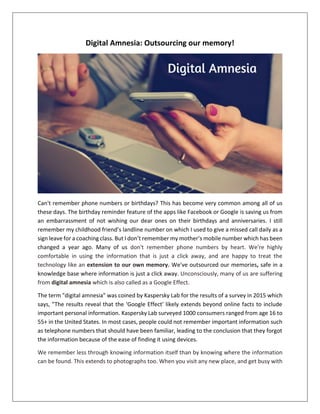Digital Amnesia - Outsourcing our memory!
- 1. Digital Amnesia: Outsourcing our memory! Can't remember phone numbers or birthdays? This has become very common among all of us these days. The birthday reminder feature of the apps like Facebook or Google is saving us from an embarrassment of not wishing our dear ones on their birthdays and anniversaries. I still remember my childhood friendŌĆÖs landline number on which I used to give a missed call daily as a sign leave for a coaching class. But I donŌĆÖt remember my motherŌĆÖs mobile number which has been changed a year ago. Many of us don't remember phone numbers by heart. We're highly comfortable in using the information that is just a click away, and are happy to treat the technology like an extension to our own memory. We've outsourced our memories, safe in a knowledge base where information is just a click away. Unconsciously, many of us are suffering from digital amnesia which is also called as a Google Effect. The term "digital amnesia" was coined by Kaspersky Lab for the results of a survey in 2015 which says, "The results reveal that the 'Google Effect' likely extends beyond online facts to include important personal information. Kaspersky Lab surveyed 1000 consumers ranged from age 16 to 55+ in the United States. In most cases, people could not remember important information such as telephone numbers that should have been familiar, leading to the conclusion that they forgot the information because of the ease of finding it using devices. We remember less through knowing information itself than by knowing where the information can be found. This extends to photographs too. When you visit any new place, and get busy with
- 2. clicking pics rather observing the place curiously, you end up remembering the incidents as a stand still frames and not as an event in details which has start, middle and end. Dr Maria Wimber from Birmingham University says: ŌĆ£Constantly looking at the world through the lens of our smartphone camera may result in us trusting our smartphones to store our memories for us. This way, we pay less attention to life itself and become worse at remembering events from our own lives." It wasnŌĆÖt so long ago that a student in search of information had to turn to printed resource like a reference book, textbook, or academic journal & research paper. Though the information mightŌĆÖve been a bit out of date at the time of referring; still, those sources were generally credible and relatively unbiased. Now-a-days, weŌĆÖve got an endless stream of information at our fingertips: real-time updates from social media, breaking news alerts, mobile app notifications and random information that anyone from anywhere around the world can access or update. Our cognitive skills are getting reshaped by our digital behaviors, including how well we assess the integrity of the information weŌĆÖre browsing through. It can be easily understood why instant gratification wins out easily over critical evaluation of sources. Clicking away or swiping left the moment interest fades result in ŌĆ£less rigorous and automaticŌĆØ thinking. Forget about big books, It has become difficult for us to read long articles. Knowingly or Unknowingly, weŌĆÖve chosen this behavior. While many of the researchers and psychologists are debating over ŌĆō if the technology is making us shallow and dumb, it seems interesting to keenly observe our own behavior in this digital era and compare it with our behavior before the Google Age.


